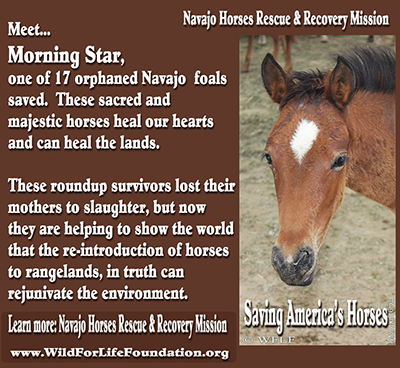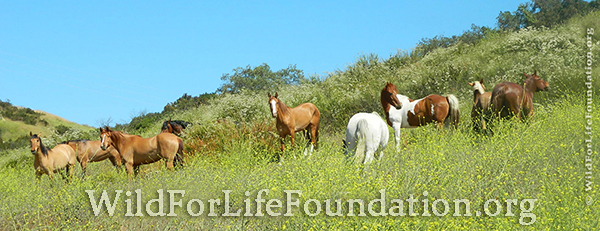Orphaned Navajo Foals - Ambassadors Raising Awareness for Ecology and Horses
|
Even from their small ‘cradles’ these baby horse Ambassadors have inspired an awakening in the fulfillment of loving animal care. The heartwarming story of the foals’ rescue and survival is helping to restore hope across multiple cultures for the horses and our lands.

The first group of 21 orphaned Navajo foals were rescued in late 2013 by Wild for Life Foundation (WFLF) under the Navajo Horses Rescue and Recovery Mission. The foals ranging in ages from 1 - 6 months were orphaned during the roundups and had been discovered in life threatening situations after losing their mothers to slaughter.
WFLF has since rescued 100's imperiled and slaughter bound wild horses, including dozens of orphan foals and pregnant mares. Volunteer rescue team members from the Wild for Life Foundation continue to place their lives on hold to rescue, recover, evacuate and provide needed ongoing care for survivors.
When a baby foal become orphaned it takes around the clock care to tend to their needs and keep them out of the dark, and many months of for these ones to heal, and overcome the physical and emotional injuries they may sustain during their capture.
Their full recovery can take upwards to a year or more. Deprived of their Mother's milk to nourish and protect them, their delicate systems require special milk-replacer feeds and immune building supplements to help them be able to grow and thrive.
HORSES AND ECOLOGY
Conservationists in several parts of the world have been studying the re-introduction of wild equines to the rangelands as a way to restore the natural environment and wildlife. For example, the Konik horses (tarpan wild horses) have been successfully returned to the landscapes in Britain. Wild horses are being recognized for bringing light grazing and natural fertilization benefits to the lands where they roam. Their restoration to the rangelands has truly helped to boost biodiversity, and has also encouraged the return of a wider variety of plants and invertebrates.
Craig Downer, wildlife ecologist, WFLF Advisory Board Member, and author of “The Wild Horse Conspiracy” points out that wild horses are a big benefit to the ecosystem. They help to create that very important soil substance known as Humus...which makes the soils more nutrient-rich, adhesive and more retentive to water. This aids greatly in increasing the moisture of soils and elevating the water tables. The manure of wild horses builds the soils and disperses the intact seeds of many species to a much greater degree than cattle and sheep. Wild free-roaming horses also greatly reduce the possibility of catastrophic fires which can sterilize the soils and destroy its seed banks.
In fact, arguments made by proponets of slaughter and in favor of the removal wild horses from open range-lands as a necessity for cattle grazing can no longer be accepted. Recent findings through Princeton University have shown how combining wild equine grazing together with cattle may actually create beneficial effects for cattle. According to the Princeton University's Morgan Kelly, “Two recently published papers — including one in the journal Science — offer the first experimental evidence that allowing cattle to graze on the same land as wild horses can result in healthier bovines by enhancing the cows' diet”. Experiments like these have not yet been carried out on US soil, but the findings indicate that more dialogue and research is called for. "Clearly, blanket statements that wild equids invariably compete with livestock can no longer be accepted” states Michael Coughenour, a senior research scientist at the Colorado State University Natural Resource Ecology Laboratory.
We are honored and grateful to serve these and other at risk equines whose lives are a testiment to their ability to heal our hearts and our lands. Through their stories of survival, rescue and recovery they help us raise awareness about the need for stronger preservation ethics to the world; a message that illuminates how letting go of the old can lead to paths of environmental replenishment, healing and harmonious coexistence.
Donations are are tax deductible to the full extent permitted by law. Federal ID No. 26-3052458
|
|
|
